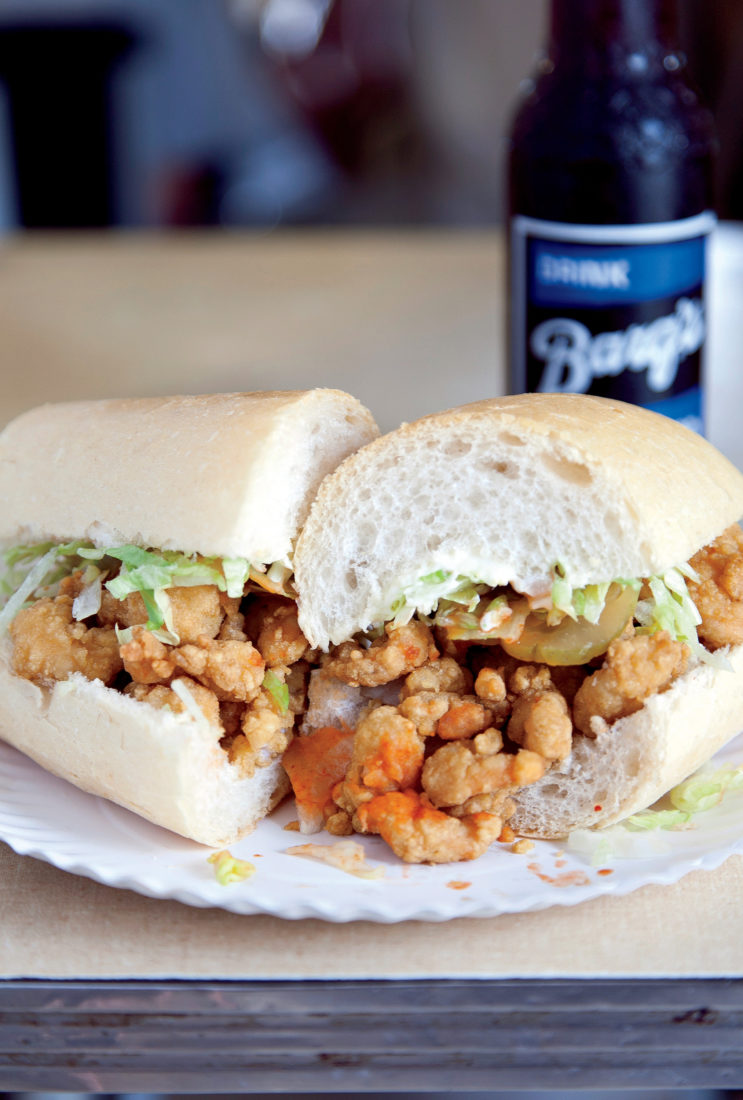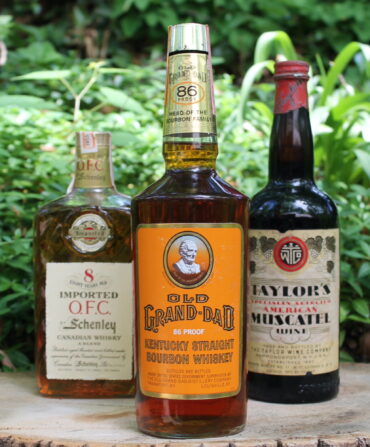Can you remember the happiest you’ve ever been? I am not talking about the birth of a child, or finding religion, or anything to do with a lottery ticket or go-go boots. I guess that would be Big Happy. I am talking about being a little happy, being glad in your own skin, for one modest moment in time.
I can remember.
It was on Annunciation Street. It was almost a decade ago, not long after I returned to my little shotgun double in Uptown New Orleans from a life sentence in an ice-bound gulag—really just two weeks covering the Winter Olympics in Salt Lake City. I was homesick, and hungry. Dodging potholes so old and deep that the devil must use them as a shortcut home, I bounced down Annunciation Street to a place called Domilise’s Po-Boy and Bar.

Photo: Sara Essex Bradley
Dot Domilise and Raymond Chauvin.
Inside, a cadre of no-nonsense ladies were spreading sizzling fried shrimp on perfect French bread, then dressing them in shredded lettuce with just enough mayonnaise and a drizzle of red sauce (ketchup, hot sauce, and white magic). No tomatoes. You cannot get good tomatoes all the time in New Orleans, so Dot Domilise, the queen of this place, banned them. “They kinda get in the way,” she said. The shrimp were perfect, not too big, not too small. “If they’re too small,” she said, “you just get the crust.”
I took my sandwich, with a cold Barq’s root beer, to an ancient table. I looked at it for a minute, thinking how odd that anyone would call such a lustrous thing a “po’boy.” Then, I took a bite. I cannot tell you how it tasted; my dictionary only has words coined by mortal men. But that was one damn good sandwich.
People love this old city for many reasons, for music and architecture, of course, and some for the fact that they can careen dang near naked down Bourbon Street one night and then go home to Indiana and sell life insurance. But for me, when I come back to this city, I am happiest in the company of a po’boy.
They are iconic now, like red beans. People argue over who has the best, but there are so many places and so many recipes—from fried oysters to roast beef, barbecued shrimp to catfish, soft-shell crab to hot smoked sausage—that picking one is like feeling around in a sack of rubies.

Photo: Sara Essex Bradley
Delanie Manuel with the barbecued shrimp po’boy at Liuzza’s.
I am not a native and have not lived here for a long time, and if I am a food critic, I am a fat Italian opera singer. I volunteered to write this story about po’boys so I could return to New Orleans and eat some more. But there is something strange about them. You hold one in your hands and you feel like a native, the same way, when I hold a fine Cuban sandwich in Miami, I think I can speak Spanish. Hand me a fried oyster po’boy, and I catch myself muttering, “Oh, y’ah, babe,” and such as that.
People here still discuss, sometimes loudly, how the sandwiches got their name, but perhaps the most popular story dates back to the flames and flying bricks of the city’s streetcar strike in ’29. Two brothers, Clovis and Benjamin Martin, gave striking transit workers free sandwiches—said to be made from debris from roast beef on French bread—at their restaurant on St. Claude Avenue. When a hungry striker walked up, workers there would shout that another poor boy was at the door. And if that’s not the truth, it ought to be. People are always finding new po’boys, fancier ones, but I do not pretend to be on a voyage of discovery for a foie gras po’boy or one stuffed with quail’s eggs.
For me, Domilise’s will always be queen. The sandwiches constructed in the small restaurant were so consistently fine that once a group of writers made a pact not to mention the restaurant in stories about New Orleans in fear that Domilise’s, like so many neighborhood jewels, would be overrun by tourists who would not know the difference between a po’boy and a pineapple upside-down cake. That secret, if it ever was one, has long since gotten out. “I’m an old lady now,” Dot Domilise says, but there still ain’t no bad tomatoes mushing up her po’boys.
The first time I walked in there—the first thing you see are those ladies cooking—I almost apologized and backed out. People like to say that walking into a family restaurant is like walking into someone’s kitchen, but there you do.

Photo: Sara Essex Bradley
A soft-shell crab po’boy at Liuzza’s by the Track.
I asked Dot where she goes if she wants a po’boy.
“There’s good places,” she says, “you know, in other neighborhoods.”
For many people in New Orleans, the best po’boy—a direct descendant of the ’29 sandwich—is roast beef, but lavish now, shaved thin, piled high, and smothered in brown gravy. How much gravy? One New Orleans resident once said it’s not enough unless, when you hold the sandwich over your head, the gravy runs halfway down your arm.
Terri Troncale, the statuesque editorial page editor at the Times-Picayune, does not require that much, but concedes, in this city of excess, she has never encountered a dry sandwich. Her favorite roast beef is found not far from Bayou St. John in Mid-City, at a place called Parkway Bakery & Tavern.
“It tastes like my momma’s pot roast. Wonderful,” says Troncale. The roast beef is tender, the gravy just right, permeating the bread. The taste builds a bridge in her memories. With that first bite, “I think about my momma.”

In my own failing memory, I can build whole days around a po’boy. Once, when a friend was sanding the floors of his shotgun double, I volunteered to go get lunch—driving being preferable to sanding, and much better than sweeping. I was in a backed-up line at a fast-food hamburger joint when it struck me: I was in New Orleans, and I was simmering here, in exhaust fumes, to get a bad hamburger?
I fled to the tiny Guy’s Po Boys on Magazine Street for some sandwiches to go, planning on a couple of simple ham and cheese po’boys. But there on the menu was the most ridiculous thing: pork chop po’boys. I think I might have clapped my chubby little hands together like a child.
I ordered two pork chop po’boys, grilled, dusted with cayenne, and dressed with lettuce, tomato, and mayo. I grabbed two root beers and some Zapp’s potato chips. Zapp’s, made down here, are to regular chips what a shot of Jim Beam is to warm milk. The sandwiches came wrapped in clean white butcher paper, a foot long. We ate them on the stoop, and I cannot recall a word we said; could be we never said much to remember, anyway. But I can still see the stoop of that fine old house, still see the cast-aside white butcher paper, redolent of mayonnaise, still smelling of grilled pork. I remember thinking: “Wonder if anybody would notice if I licked that?”
If I were a sandwich, I think, I would be a po’boy, overstuffed, a little sloppy, relatively cheap, and bad for you—and, as often as in reality, wearing gravy someplace on me. But two of my favorite po’boys do not really resemble—or pretend to be—po’boys at all.
Casamento’s Restaurant on Magazine may be one of the most unusual restaurants I have ever seen. The interior is covered in gleaming tile and, in a city that can sometimes shrug off niceties for the sake of great food, is eerily clean. It is only open in the cooler months, which down here is a relative term. But its sandwiches are worth waiting on.

Photo: Sara Essex Bradley
The shrimp po’boy at Parkway Bakery & Tavern.
Its oyster loaf is filled with some of the finest such creatures I have ever encountered, delicately covered in corn flour and fried in an honest-to-God iron skillet. They are served on thick slabs of white bread, not the airy French bread or more chewy Cajun bread. And that, oysters and bread and maybe a taste of butter, is all you need here. I love my condiments, but this would only tart up perfection.
At Liuzza’s by the Track, the barbecued shrimp po’boy has a legend of its own. It is barbecued only in the New Orleans sense, meaning that shrimp are cooked in butter and spices, then stuffed into hollowed-out bread and drenched in the buttery liquid from the skillet. I ate as much as I could and wore the rest home on the front of my shirt, and I am not ashamed. I had heard about this sandwich so long from so many people that, when I finally went to the restaurant, I was afraid that it—like Bigfoot—did not really exist. Drowned by Katrina, Liuzza’s rose from several feet of water with its legends, and menu, intact.
There are a dozen, two dozen more good sandwiches, slowly crumbling in my memories. But one I never got to try. Dirt-common in New Orleans, it is the french fry po’boy, slopped over with brown gravy and dressed with mayonnaise, lettuce, and tomato.
You can make a face if you want. But you know you want one, too.








